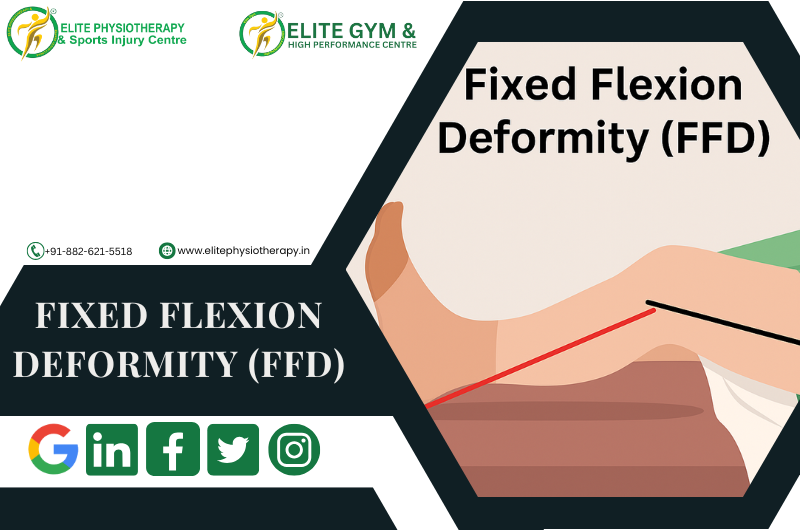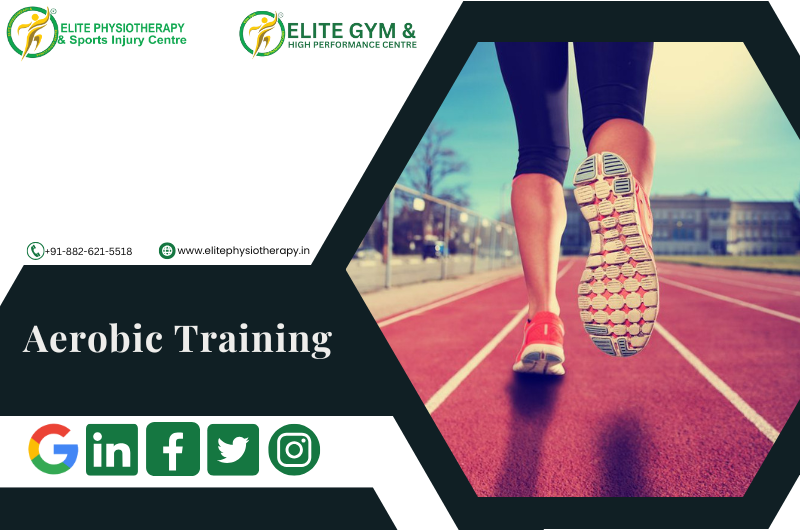Introduction
A painful joint disorder that impairs functional mobility, particularly in athletes and active people, is called fixed flexion deformity (FFD). Using cutting-edge tools and customized rehabilitation plans, we at Elite Physiotherapy and Sports Injury Centre are experts in the thorough and sophisticated physiotherapy care of FFD. Our method restores range of motion and improves quality of life by combining advanced modalities with comprehensive functional evaluations.
What Is Fixed Flexion Deformity?
Fixed Flexion occurs when soft tissue or bone limitations prevent a joint, especially the knee or elbow, from being fully extended. This condition is referred to as Fixed Flexion Deformity. Even with outside help, the joint in this situation cannot fully extend and stays in a partially flexed position.
Causes of Fixed Flexion Deformity
- Prolonged joint immobilization (post-injury or surgery)
- Muscle imbalances or tightness, especially hamstring or biceps contractures
- Joint effusion or intra-articular swelling
- Fibrosis or adhesions in periarticular structures
- Post-traumatic arthritis or osteoarthritis
- Neurological disorders causing spasticity or contractures
- Congenital conditions or developmental joint abnormalities
Usually, FFD develops gradually. For example, if the joint is kept in a flexed position for a long period of time following an injury, the soft tissues will adapt by shortening. Extension is limited throughout time by fibrotic alterations in the muscles, ligaments, and joint capsules. Incomplete healing or inadequate rehabilitation can also make the illness worse.
Clinical Features and Symptoms
- Unable to completely straighten the affected joint
- Stiffness in the joints, particularly after rest or in the morning
- Pain or discomfort when exercising or lifting weights
- Functional restriction,s whether it comes to lifting, running, or walking
- Changes in the lower limb FFD gait pattern
- Muscle atrophy brought on by inactivity
- Joint malformation that is visible in more advanced cases
Diagnosis at Elite Physiotherapy and Sports Injury Centre
Effective therapy at our clinic is based on a precise diagnosis. For every patient, we employ a mix of functional and physical evaluations.
Physical Assessment Includes:
- Active and passive range of motion are measured goniometrically.
- Checking for fibrosis, tightness, and tenderness
- Muscle testing by hand to detect imbalances or weakness
- Assessment of joint play to determine capsular limitations
Special Physiotherapy Tests:
- Thomas Test – to assess hip flexor contracture in lower limb FFD
- Ely’s Test – for rectus femoris tightness
- Popliteal angle test – for hamstring flexibility
- Prone knee flexion test – for detecting quadriceps tightness
- Extension lag test – to identify quadriceps weakness or adhesion
Advanced Physiotherapy Management at Elite Physiotherapy
At Elite Physiotherapy, our Team is committed to treating the underlying cause rather than just the symptoms. To deliver safe and efficient care, we integrate functional rehabilitation, manual therapy, and state-of-the-art modalities.
1. Manual Therapy Techniques
- Myofascial release to target soft tissue restrictions
- Joint mobilization to improve capsular elasticity
- Soft tissue manipulation for fibrosis breakdown
- Muscle energy techniques to lengthen shortened muscles
2. Stretching and Mobility Exercises
- Prolonged low-load static stretching using positioning aids
- Active-assisted and passive stretching exercises
- Functional movement training to integrate improved ROM
- Proprioceptive neuromuscular facilitation (PNF) for neuromuscular control
3. Strengthening Exercises
- Isometric and eccentric strengthening for antagonist muscles
- Closed-chain exercises to improve joint stability
- Functional retraining to restore gait or upper limb function
4. High-End Modalities for FFD Management
CRET Therapy (Capacitive and Resistive Electric Transfer)
- Promotes deep tissue heating
- Reduces fibrosis and improves elasticity
- Enhances cellular metabolism and tissue regeneration
Super Inductive System (SIS)
- Stimulates neuromuscular activation
- Breaks pain-spasm-pain cycle
- Improves joint mobility and motor control
High-Intensity Class 4 Laser Therapy
- Penetrates deep tissues to reduce inflammation and fibrosis
- Stimulates collagen remodeling
- Accelerates healing of soft tissue structures
Shockwave Therapy (if fibrosis is present)
- Used carefully in chronic cases with soft tissue calcifications
- Stimulates neovascularization and tissue regeneration
- Breaks down adhesions and scar tissue
Hydrotherapy
- Useful for early mobility training in chronic FFD
- Reduces joint loading while promoting ROM
- Aids in functional muscle activation
Personalized Care at Elite Physiotherapy
We are aware that each patient is unique. Our FFD treatment regimens are therefore completely tailored and modified following goals, progress, and response. We guarantee the following at Elite Physiotherapy and Sports Injury Centre:
- Individualized care from skilled physiotherapists
- Frequent monitoring of functional progress
- Resolving the contributing biomechanical issues
- Support for athletic and ergonomic training
- Exercise regimen at home with professional supervision
When to Seek Help
Consult us right away if you observe a gradual loss of extension or joint stiffness that doesn’t go away with rest. Early intervention lowers the chance of lifelong malformation and greatly improves results.
Final Thoughts
Fixed Flexion Deformity restricts performance, confidence, and independence in addition to affecting joints. Elite Physiotherapy & Sports Injury Centre enables patients to regain full mobility and resume optimal performance through a targeted, evidence-based, and comprehensive physiotherapy approach. We are the premier option for managing FFD in Delhi and NCR due to our cutting-edge physiotherapy solutions and extensive clinical expertise.
Book your consultation today and take the first step toward a pain-free, mobile future.






